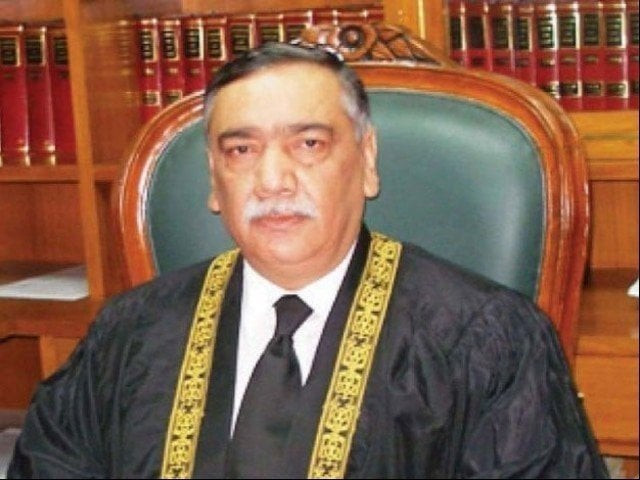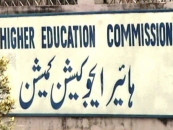Bar threatens to protest CJP's 'expeditious justice' proposal
Warns of court boycott if NJPMC decision not reversed in three days

Chief Justice of Pakistan Asif Saeed Khosa.PHOTO: FILE
Since the lawyers' movement, whenever the judiciary has tried to take the initiative to introduce judicial reforms, the bars have opposed it tooth and nail. Reforms would become untenable without the support of the bar.
In 2009, former chief justice Iftikhar Muhammad Chaudhry introduced the National Judicial Policy for early disposal of cases, but lawyers criticised it, saying "justice hurried is justice buried".
Likewise, when ex-Lahore High Court chief justice Mansoor Ali Shah took initiatives for judicial reforms in Punjab, he faced strong opposition from one section of lawyers. The situation was only 'resolved' when he was elevated to the Supreme Court.
Now, incumbent CJP Khosa is working to introduce judicial reforms to reduce unnecessary burden on judges but is apparently facing similar challenges.
The National Judicial Policy Making Committee, which is a body of all chief justices to bring judicial reforms in the country, on March 11, resolved that applications under section 22-A CrPC may not be entertained by the courts unless accompanied by the decision of the relevant district SP Complaints.
CJP Khosa believes that currently, sessions and additional sessions courts, under the Code of Criminal Procedure, 1898, are burdened with cases relating to giving directions to the police authorities for registration of cases. He says that such jurisdiction is tantamount to the involvement of the judiciary in executive functions and is against the principle of separation of powers.
From January 1, 2017 to February 28, 2019, a total of 614,307 cases were filed under section 22 A/22 B CrPC in the district judiciary throughout the country, while during the same period, 47,029 cases under the said provisions were filed in high courts.
At the Supreme Court, change is in the air
The NJPMC on March 11 resolved that since a Police Complaint Redressal Mechanism, in line with the recommendations of the Police Reforms Committee, has been operationalized at district level in all over Pakistan, which is headed by SP Complaints, applications under section 22 A Cr.P.C may not be entertained by the courts unless accompanied by the decision of the relevant district SP Complaints.
Bars opposed NJPMC
The legal community started protests soon after the committee's decision, as it apparently affects lawyers' practice. Pakistan Bar Council, which is apex body of lawyers, has strongly reacted over the decision and threatened to boycott court proceedings if the NJPMC decision is not reversed within three days.
PBC Vice Chairman Amjad Shah, after having consulted with representatives of the provincial and Islamabad bar councils, severely criticized the NJPMC's decision. In his statement, he claimed that the decision will expand the powers of the police which would not only leave aggrieved persons at the mercy of the police but will also open another avenue of malpractice and corruption in the police.
The statement says that the decision of the NJPMC would not only frustrate the already much flawed criminal justice system but would also spoil the powers of Justice of Peace. He has also deplorable that while making such vital decisions having a great impact on the criminal justice system and valuable legal rights of aggrieved persons, the Bar Councils and the Bar Associations have not been taken on board and consulted.
He has, therefore, demanded the immediate reversal of the decision within a period of three days, otherwise, the legal fraternity will chalk out its future course of action which may also lead to strikes and other recourse till acceptance of its demands.
Alternate view
At the same time, several lawyers backed the CJP reforms agenda and oppose the bars' stance. PBC executive member Raheel Kamran Sheikh says that an emergent meeting of PBC should have been convened to discuss and develop a well-reasoned response instead of abruptly issuing a press release which imparts the impression that we lawyers are opposed to any reform in the justice system to preserve our self-interests.
"Personally, I am of the opinion that when an SHO does not register an FIR, notwithstanding that the complainant has laid information before him disclosing commission of a cognisable offence, there is nothing wrong in principle in providing for a time-bound, effective and confidence inspiring mechanism of internal accountability within the police force and asking the complainants to exhaust that before invoking the jurisdiction of the court," Sheikh said in his statement.
A senior lawyer, who is principally supporting NJPMC decision, believes that CJP should have consulted the representatives of bars before taking any such step for expeditious justice. He said the practices of 95 per cent of lawyers in lower courts revolve around filing applications under Section 22-A CrPC, and such lawyers fear that such a decision may affect their practice.
At the same time, he opined that the CJP should consult the representatives of bars before taking such decisions. Law and Justice Commission of Pakistan has also issued a statement that some sections of the bar councils and bar associations have not properly understood the recent NJPMC decision.
The office of the Superintendent of Police (Complaints) has been created as a part of the complaints against the police redressal mechanism as a forum of internal accountability within the police and creation of that office in no way takes away or abridges the jurisdiction of a Justice of the Peace…or a high court ... An aggrieved person can still lawfully approach a Justice of the Peace or a High Court in respect of a complaint against the police after exhausting his adequate alternate statutory remedy before a Superintendent, says the statement issued by LJCP secretary Dr Raheem Awan.



















COMMENTS
Comments are moderated and generally will be posted if they are on-topic and not abusive.
For more information, please see our Comments FAQ